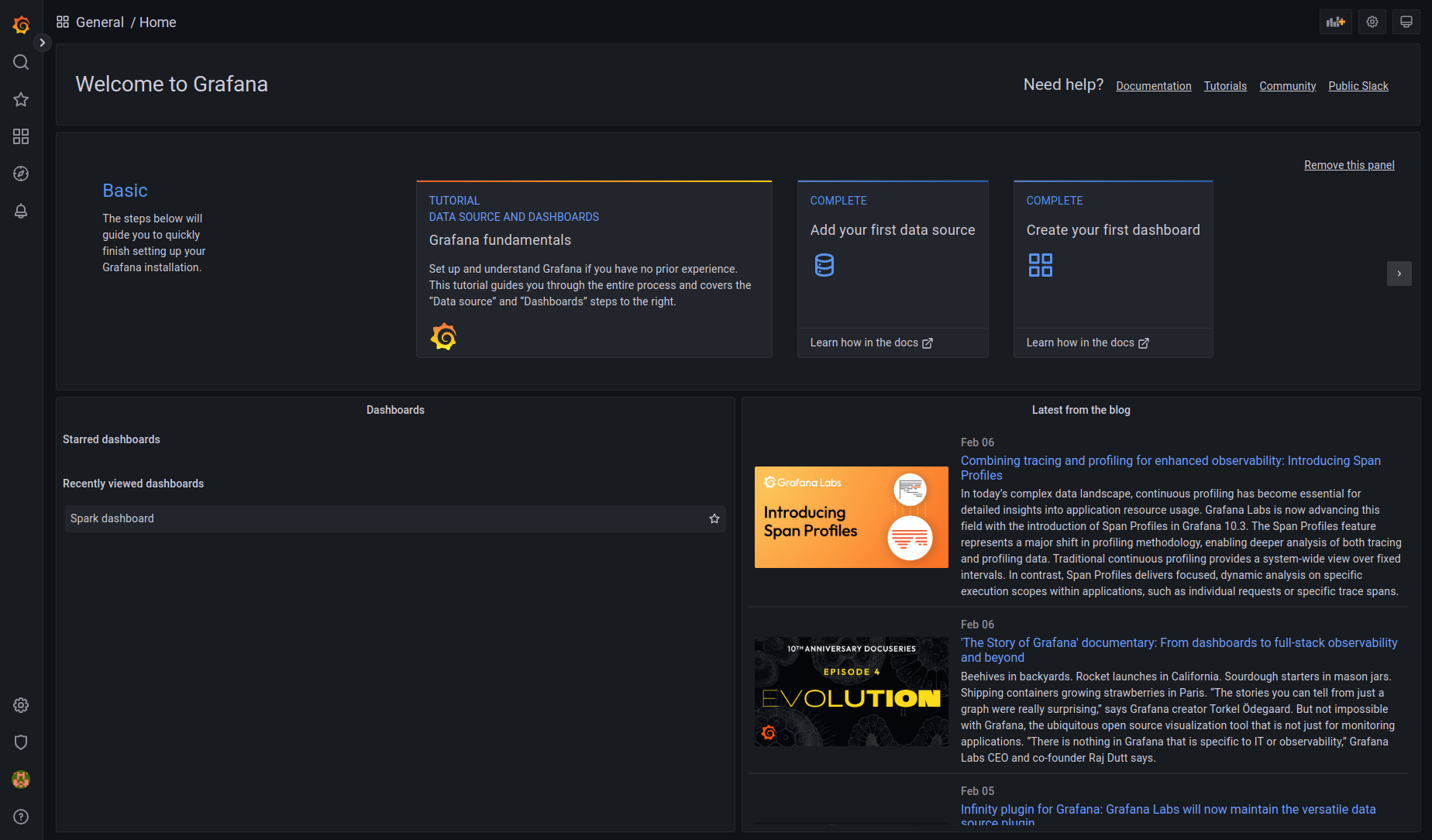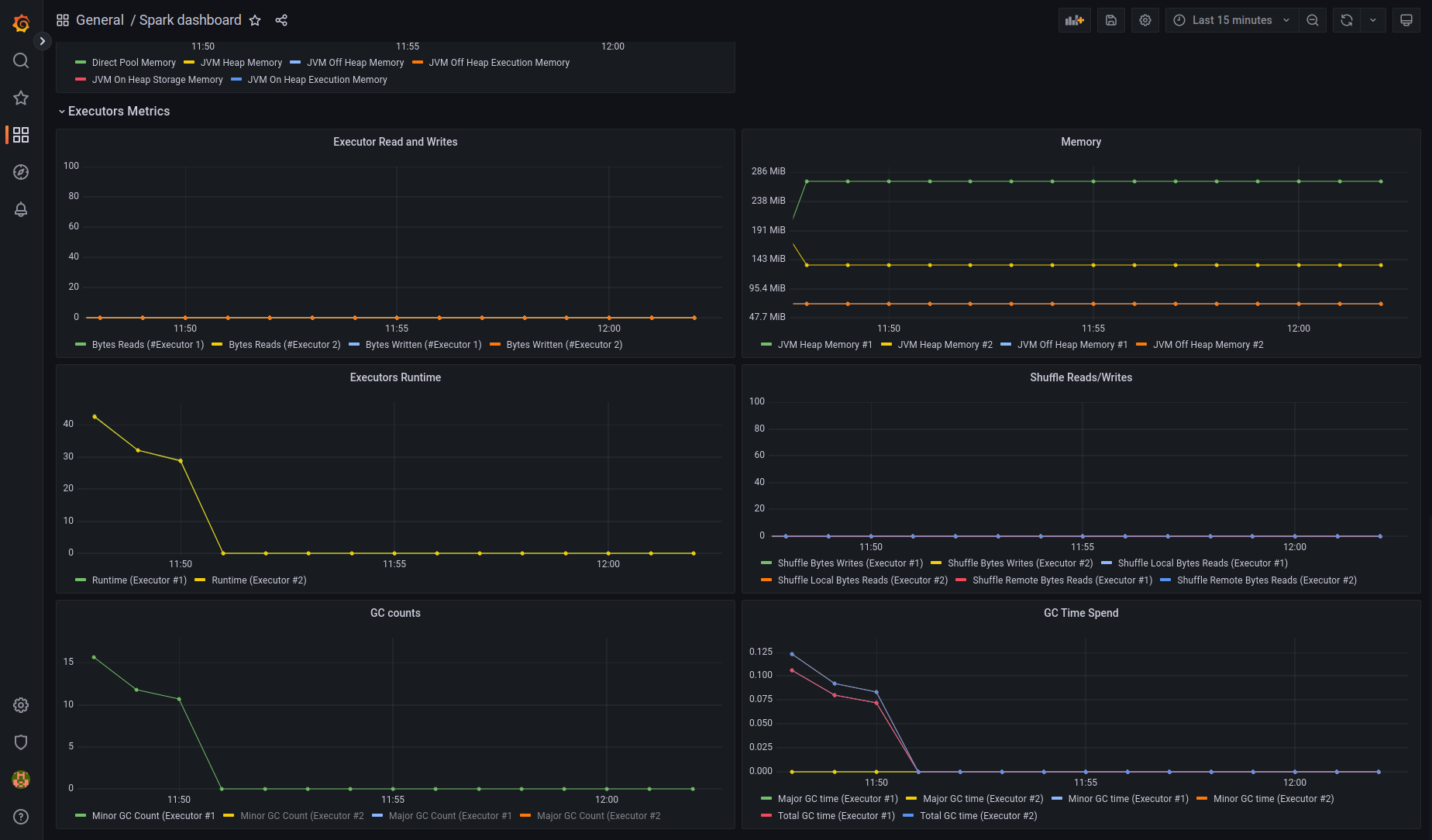5. Monitoring with Canonical Observability Stack
The Canonical Observability Stack (COS) is a set of tools that facilitates gathering, processing, visualizing, and setting up alerts on telemetry signals generated by workloads in and outside of Juju. It is a universal monitoring solution that is designed for cluster administrators, allowing them to set up alerts and dashboards based on resource utilisation.
The Charmed Apache Spark solution comes with the spark-metrics exporter embedded in the Charmed Apache Spark OCI image which is used as a base image for driver and executor pods. The exporter is designed to push metrics to the Prometheus Pushgateway, which in turn is integrated with the Canonical Observability Stack.
To enable observability on Charmed Apache Spark, two steps are necessary:
- Deploy the COS (Canonical Observability Stack) bundle with Juju
- Configure the Apache Spark service account to use the Prometheus sink
Let’s start by creating a fresh Juju model with the name cos:
juju add-model cos
Now, deploy the cos-lite charm bundle:
juju deploy cos-lite --trust
When you deploy the cos-lite bundle, it deploys several charms like Prometheus, Grafana, Loki, etc. that together build up the Canonical Observability Stack.
Check the list of charms that have been deployed, their statuses, and relations:
juju status --relations --watch 1s
Wait until the status to be active for each charm:
Model Controller Cloud/Region Version SLA Timestamp
cos k8s microk8s/localhost 3.1.7 unsupported 15:41:53+05:45
App Version Status Scale Charm Channel Rev Address Exposed Message
alertmanager 0.25.0 active 1 alertmanager-k8s stable 96 10.152.183.249 no
catalogue active 1 catalogue-k8s stable 33 10.152.183.165 no
grafana 9.2.1 active 1 grafana-k8s stable 93 10.152.183.124 no
loki 2.7.4 active 1 loki-k8s stable 105 10.152.183.145 no
prometheus 2.47.2 active 1 prometheus-k8s stable 159 10.152.183.129 no
traefik 2.10.4 active 1 traefik-k8s stable 166 192.168.10.120 no
Unit Workload Agent Address Ports Message
alertmanager/0* active idle 10.1.139.112
catalogue/0* active idle 10.1.139.82
grafana/0* active idle 10.1.139.115
loki/0* active idle 10.1.139.110
prometheus/0* active idle 10.1.139.95
traefik/0* active idle 10.1.139.114
Integration provider Requirer Interface Type Message
alertmanager:alerting loki:alertmanager alertmanager_dispatch regular
alertmanager:alerting prometheus:alertmanager alertmanager_dispatch regular
alertmanager:grafana-dashboard grafana:grafana-dashboard grafana_dashboard regular
alertmanager:grafana-source grafana:grafana-source grafana_datasource regular
alertmanager:replicas alertmanager:replicas alertmanager_replica peer
alertmanager:self-metrics-endpoint prometheus:metrics-endpoint prometheus_scrape regular
catalogue:catalogue alertmanager:catalogue catalogue regular
catalogue:catalogue grafana:catalogue catalogue regular
catalogue:catalogue prometheus:catalogue catalogue regular
catalogue:replicas catalogue:replicas catalogue_replica peer
grafana:grafana grafana:grafana grafana_peers peer
grafana:metrics-endpoint prometheus:metrics-endpoint prometheus_scrape regular
grafana:replicas grafana:replicas grafana_replicas peer
loki:grafana-dashboard grafana:grafana-dashboard grafana_dashboard regular
loki:grafana-source grafana:grafana-source grafana_datasource regular
loki:metrics-endpoint prometheus:metrics-endpoint prometheus_scrape regular
loki:replicas loki:replicas loki_replica peer
prometheus:grafana-dashboard grafana:grafana-dashboard grafana_dashboard regular
prometheus:grafana-source grafana:grafana-source grafana_datasource regular
prometheus:prometheus-peers prometheus:prometheus-peers prometheus_peers peer
traefik:ingress alertmanager:ingress ingress regular
traefik:ingress catalogue:ingress ingress regular
traefik:ingress-per-unit loki:ingress ingress_per_unit regular
traefik:ingress-per-unit prometheus:ingress ingress_per_unit regular
traefik:metrics-endpoint prometheus:metrics-endpoint prometheus_scrape regular
traefik:peers traefik:peers traefik_peers peer
traefik:traefik-route grafana:ingress traefik_route regular
At this point, the COS has been deployed, but Charmed Apache Spark is not yet wired up to it. Generally, Prometheus collects metrics of services by regularly scraping dedicated endpoints.
However, Spark jobs can be ephemeral processes that may not last so long and are not really appropriate to be scraped. Moreover, the IPs/hostnames of pods are likely to change between runs, therefore requiring a more complex self-discoverable automation. For these reasons, we opted to have jobs run with Charmed Apache Spark push metrics (rather than having Prometheus pulling them) to a dedicated service, called Prometheus Pushgateway, which caches the metrics and exposes them to Prometheus for regular scraping, even when the Spark job has finished.
Therefore, to wire Spark jobs up with the observability stack, we need to deploy a Prometheus Pushgateway and then add Apache Spark configuration parameters to be able to connect to it. The Prometheus Pushgateway in turn will then be integrated with Prometheus.
Let’s deploy the prometheus-pushgateway-k8s charm and integrate it with the prometheus charm:
juju deploy prometheus-pushgateway-k8s --channel edge
juju integrate prometheus-pushgateway-k8s prometheus
Now, for Apache Spark to be able to access the Prometheus gateway, we need the gateway address and port. Let’s export them as environment variables so that they can be used later:
export PROMETHEUS_GATEWAY=$(juju status --format=json | jq -r '.applications."prometheus-pushgateway-k8s".address')
export PROMETHEUS_PORT=9091
Now that we have the Prometheus gateway IP address and port, let’s create a new service account in the cos namespace with all the configuration options that the spark service account in the spark namespace has, plus a few additional configuration options related to the Prometheus Pushgateway:
Get config from old service account and store in a file:
spark-client.service-account-registry get-config \
--username spark --namespace spark > properties.conf
Create a new service account and load configurations from the file:
spark-client.service-account-registry create \
--username spark --namespace cos \
--properties-file properties.conf
Add configuration options related to Prometheus:
spark-client.service-account-registry add-config \
--username spark --namespace cos \
--conf spark.metrics.conf.driver.sink.prometheus.pushgateway-address=$PROMETHEUS_GATEWAY:$PROMETHEUS_PORT \
--conf spark.metrics.conf.driver.sink.prometheus.class=org.apache.spark.banzaicloud.metrics.sink.PrometheusSink \
--conf spark.metrics.conf.driver.sink.prometheus.enable-dropwizard-collector=true \
--conf spark.metrics.conf.driver.sink.prometheus.period=5 \
--conf spark.metrics.conf.driver.sink.prometheus.metrics-name-capture-regex='([a-z0-9]*_[a-z0-9]*_[a-z0-9]*_)(.+)' \
--conf spark.metrics.conf.driver.sink.prometheus.metrics-name-replacement=\$2 \
--conf spark.metrics.conf.executor.sink.prometheus.pushgateway-address=$PROMETHEUS_GATEWAY:$PROMETHEUS_PORT \
--conf spark.metrics.conf.executor.sink.prometheus.class=org.apache.spark.banzaicloud.metrics.sink.PrometheusSink \
--conf spark.metrics.conf.executor.sink.prometheus.enable-dropwizard-collector=true \
--conf spark.metrics.conf.executor.sink.prometheus.period=5 \
--conf spark.metrics.conf.executor.sink.prometheus.metrics-name-capture-regex='([a-z0-9]*_[a-z0-9]*_[a-z0-9]*_)(.+)' \
--conf spark.metrics.conf.executor.sink.prometheus.metrics-name-replacement=\$2
Now that Prometheus is configured, let’s configure Grafana. For this tutorial, we are going to use a basic Grafana dashboard.
Deploy the cos-configuration-k8s charm for importing the grafana dashboard:
juju deploy cos-configuration-k8s \
--config git_repo=https://github.com/canonical/charmed-spark-rock \
--config git_branch=dashboard \
--config git_depth=1 \
--config grafana_dashboards_path=dashboards/prod/grafana/
Integrate the cos-configration-k8s charm to import the grafana dashboard:
juju integrate cos-configuration-k8s grafana
Once deployed and integrated, we can check the status of the juju model with the command juju status --relations, which should be similar to the following:
Model Controller Cloud/Region Version SLA Timestamp
cos k8s microk8s/localhost 3.1.7 unsupported 17:44:56+05:45
App Version Status Scale Charm Channel Rev Address Exposed Message
alertmanager 0.25.0 active 1 alertmanager-k8s stable 96 10.152.183.249 no
catalogue active 1 catalogue-k8s stable 33 10.152.183.165 no
cos-configuration-k8s 3.5.0 active 1 cos-configuration-k8s stable 42 10.152.183.106 no
grafana 9.2.1 active 1 grafana-k8s stable 93 10.152.183.124 no
loki 2.7.4 active 1 loki-k8s stable 105 10.152.183.145 no
prometheus 2.47.2 active 1 prometheus-k8s stable 159 10.152.183.129 no
prometheus-pushgateway-k8s 1.6.2 active 1 prometheus-pushgateway-k8s edge 7 10.152.183.36 no
traefik 2.10.4 active 1 traefik-k8s stable 166 192.168.10.120 no
Unit Workload Agent Address Ports Message
alertmanager/0* active idle 10.1.139.74
catalogue/0* active idle 10.1.139.100
cos-configuration-k8s/0* active idle 10.1.139.114
grafana/0* active idle 10.1.139.85
loki/0* active idle 10.1.139.106
prometheus-pushgateway-k8s/0* active idle 10.1.139.119
prometheus/0* active idle 10.1.139.99
traefik/0* active idle 10.1.139.84
Integration provider Requirer Interface Type Message
alertmanager:alerting loki:alertmanager alertmanager_dispatch regular
alertmanager:alerting prometheus:alertmanager alertmanager_dispatch regular
alertmanager:grafana-dashboard grafana:grafana-dashboard grafana_dashboard regular
alertmanager:grafana-source grafana:grafana-source grafana_datasource regular
alertmanager:replicas alertmanager:replicas alertmanager_replica peer
alertmanager:self-metrics-endpoint prometheus:metrics-endpoint prometheus_scrape regular
catalogue:catalogue alertmanager:catalogue catalogue regular
catalogue:catalogue grafana:catalogue catalogue regular
catalogue:catalogue prometheus:catalogue catalogue regular
catalogue:replicas catalogue:replicas catalogue_replica peer
cos-configuration-k8s:grafana-dashboards grafana:grafana-dashboard grafana_dashboard regular
cos-configuration-k8s:replicas cos-configuration-k8s:replicas cos_configuration_replica peer
grafana:grafana grafana:grafana grafana_peers peer
grafana:metrics-endpoint prometheus:metrics-endpoint prometheus_scrape regular
grafana:replicas grafana:replicas grafana_replicas peer
loki:grafana-dashboard grafana:grafana-dashboard grafana_dashboard regular
loki:grafana-source grafana:grafana-source grafana_datasource regular
loki:metrics-endpoint prometheus:metrics-endpoint prometheus_scrape regular
loki:replicas loki:replicas loki_replica peer
prometheus-pushgateway-k8s:metrics-endpoint prometheus:metrics-endpoint prometheus_scrape regular
prometheus-pushgateway-k8s:pushgateway-peers prometheus-pushgateway-k8s:pushgateway-peers pushgateway_peers peer
prometheus:grafana-dashboard grafana:grafana-dashboard grafana_dashboard regular
prometheus:grafana-source grafana:grafana-source grafana_datasource regular
prometheus:prometheus-peers prometheus:prometheus-peers prometheus_peers peer
traefik:ingress alertmanager:ingress ingress regular
traefik:ingress catalogue:ingress ingress regular
traefik:ingress-per-unit loki:ingress ingress_per_unit regular
traefik:ingress-per-unit prometheus:ingress ingress_per_unit regular
traefik:metrics-endpoint prometheus:metrics-endpoint prometheus_scrape regular
traefik:peers traefik:peers traefik_peers peer
traefik:traefik-route grafana:ingress traefik_route regular
Now that we have the observability stack up and running, let’s run a simple Spark job so that the metric logs are pushed to the Prometheus gateway. For simplicity, we’re going to use the same count_ubuntu.py script that we prepared in the earlier steps of this tutorial:
spark-client.spark-submit \
--username spark --namespace cos \
--deploy-mode cluster \
s3a://spark-tutorial/count_ubuntu.py
Once the job is completed, let’s try to open the Grafana web UI and see some metrics.
The credentials for the built-in admin user and the URL to the web UI can be retrieved using the get-admin-password action exposed by the grafana charm:
juju run grafana/leader get-admin-password
The resulted output should look like this:
admin-password: w5lk07PIW5U0
url: http://192.168.10.120/cos-grafana
Open the URL in a web browser.
Log in using admin as the username and the password that we just fetched in the earlier command.
We should see the Grafana web UI:

In the navigation menu on the left, select “Dashboards” and then “Browse”.
There you should see the “Spark Dashboard” listed.
This is the dashboard we configured earlier with cos-configuration-k8s charm:

Play around the dashboard and observe the various metrics like Block Manager memory, JVM Executor Memory, etc.
